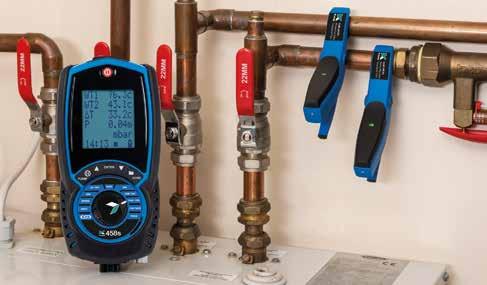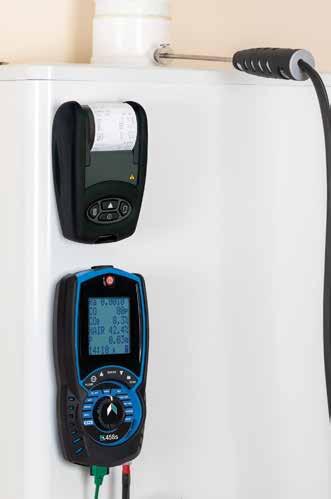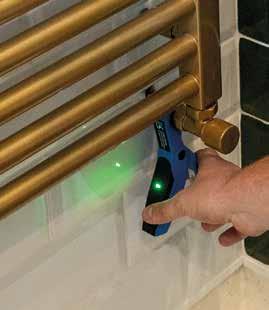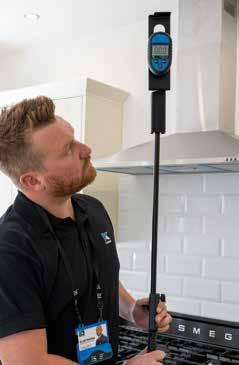
3 minute read
Why you should tell the government what you think
The industry is at a turning point. The government is consulting now on proposed legislation to make heating homes more efficient and less carbon-intensive, and here Stewart Clements, director of the Heating and Hotwater Industry Council (HHIC), sets out why a response from heating engineers is vital to the sector’s future.
The government’s consultation
Improving boiler standards and efficiency includes proposals around three main areas:
• Recommendations to ensure that newly installed gas boilers are performing as efficiently as possible
• Making the case for requiring gas boilers to be ‘hydrogenready’ at the point of sale to facilitate a potential switch to hydrogen heating
• The potential role of hybrid heating systems to support decarbonisation objectives.
Around these three strands, the consultation makes recommendations on potential commissioning requirements and skills and training for engineers.
Short-term impact
Parts of the consultation seek to build on the Boiler Plus requirements and ensure that this has been effective in improving efficiency. A review of the scheme flagged several potential barriers and opportunities to go further with regulations. Some participants suggested that a lack of monitoring and oversight of the additional measures fitted alongside gas combination boilers may have diluted the impact of the standards.
In addition, consumer engagement with, and understanding of, the standards and the products they were receiving appears to have been very limited. This could explain their lack of impact, especially in terms of the benefits delivered by certain types of room thermostats, including smart controls.
The review also highlighted that the most suitable control option for each install may not have been selected. This is where plans in the consultation have been made to tighten requirements of products to comply with Boiler Plus.
This may not stop with combination boilers. Plans to extend Boiler Plus to regular and system boilers could require pipework modification between the boiler, cylinder and motorised valve. This could entail modifications to the wiring for a significant proportion of alreadyinstalled stock. Specific knowledge and qualifications will be required, and so modifications would need to be carried out by a suitably qualified heating engineer or electrician.
Correct temperatures
Aound half of homes have heat emitters at the correct size to provide comfort at a 55°C flow temperature on an average winter day – a temperature of around 4°C. As such, there is a significant opportunity to improve boiler efficiency by recommending systems to operate at these lower temperatures for the vast majority of the year.
The proposed legislation outlined in the consultation may require heating engineers to carry out room-by-room heat-loss calculations for new and replacement installations so that lower temperatures can be used: a process that the HHIC fully supports for ensuring effective installation.

To aid with effective system balancing, auto-balancing thermostatic radiator valves are recommended by the HHIC, which also proposes a requirement in the Building Regulations for such devices on all systems. This would ensure correct balancing and therefore optimal performance at all times across new and replaced heating systems.
To ensure system sizing, room-by-room calculations and system balancing are in place and work effectively, completing Digital Benchmark as a record of the work undertaken will help to
Why should you respond?
It’s important that everyone has their say when a consultation that is set to change the future of the heating industry comes to the fore. The HHIC is calling on gas engineers across the UK to respond to the questions most relevant to their views so that the government has a clear view of feedback.
The industry must move towards a more efficient, low-carbon future in line with the UK’s 2050 net zero mandate. For proposed policy like this – which could affect the everyday work of heating engineers – it is vital that decisions are made that do not make providing suitable and efficient heating and hot water provision over-complicated. Without a first-hand perspective from heating engineers, reaching decarbonisation goals will not be realistic.
You can give your response to the consultation at: www.gov.uk/government/consultations/improving-boilerstandards-and-efficiency provide a measure of progress and a record of completion.
Long-term thinking
Correct commissioning and installation of the boiler is crucial for the system to operate efficiently and cost effectively. But ongoing maintenance and servicing are also needed to ensure that they stay safe and efficient. Lack of regular maintenance means that performance is likely to degrade over time. As suggested by the National Energy Efficiency Association, and encouraged by the HHIC, mandating servicing and using Digital Benchmark for the records would be a solution to implementing this across all homes.
Into the future
The proposed mandating of hydrogen-ready boilers and potential legislation around hybrid heat pump systems are what could vastly change your work.
If hybrids are included in legislation, then our view is that an installation standard is required. Detailed product knowledge for each system will inevitably be required and so heating engineers will need to undertake manufacturers’ training courses.
If the hydrogen economy grows further, gas engineers will also need to train for 100 per cent hydrogen installations. ■ • See page 31 for more detail on the proposals for controls.









